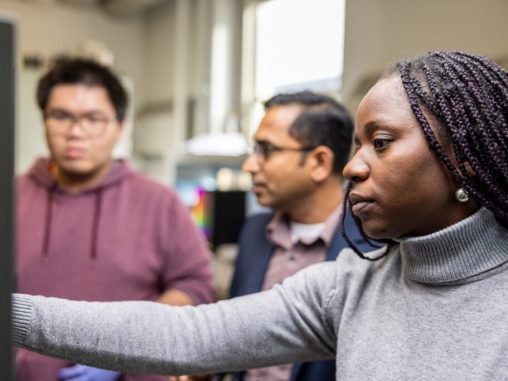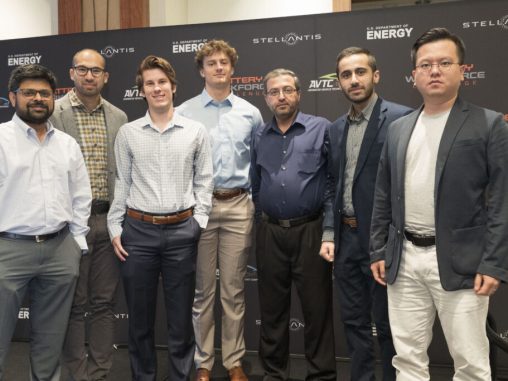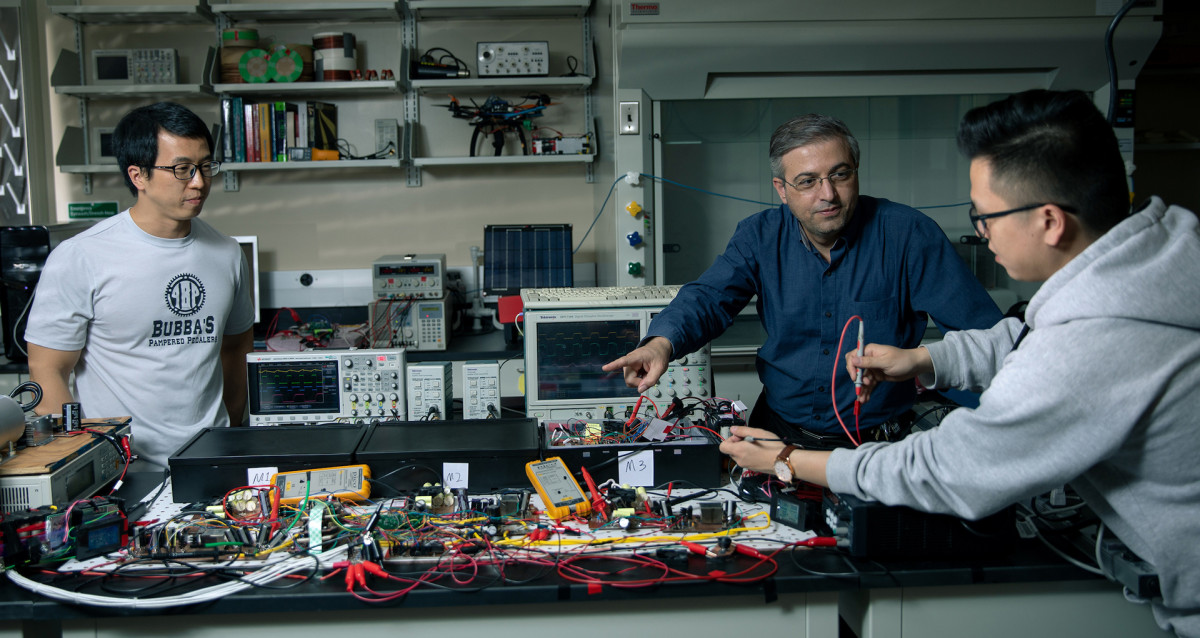Faculty and their students are conducting research in four core electrical and computer engineering areas: devices and materials; electromagnetics; electromechanical and energy systems; and embedded systems.

A one-of-a-kind graduate program at The University of Alabama will pave the way for highly skilled professionals to enter the ranks of the critical field of precision timing. With nearly $3 million in support from the National Science Foundation, UA is offering 24 graduate school fellowships. The fellowships pay tuition and a stipend for students to concentrate in precision timing, the field of hyper-hyper accurate timekeeping traditionally based on atomic clocks.

University of Alabama seniors Anika Cho, of Beaverton, Oregon, and Owen Emerson, of Huntsville, are two of 12 college students from around the nation to receive the U.S.-Ireland Alliance’s George J....

A team of students from The University of Alabama will compete in a premier national competition to design, build, test and integrate an advanced battery pack into a commercial electric...

UA’s Department of Electrical and Computer Engineering conducts research projects worth several million dollars annually. Faculty and their students are conducting research in four core electrical and computer engineering areas:
This research area is focused on fundamental and applied research on materials and devices. Active research includes magnetic materials for electromagnetic devices in electric machines; synthesis of nanomaterials for electronic and photonic nanodevices; oxide materials for MEMS piezoelectric and multiferroic sensors/actuators. A group of ECE faculty work on a broad spectrum of solid-state devices, including solar cells, sensors, and terahertz (THz) biomedical imaging.
Electromagnetics involves solving Maxwell’s four equations and is the underpinning of the electromagnetic device and system design. Maxwell’s equations describe the law of electricity and magnetism. Electromagnetics applies the four equations to electromagnetic device performance analysis. Microwave communications, radio propagation in antennas, microwave millimeter engineering, remote sensing, and object imaging are based on electromagnetics’ dynamic field.
This research area is focused on computing systems in all aspects and applications. Active research by the UA ECE faculty includes robotics, intelligent sensors, computer vision, machine learning and deep learning, wearable sensors, security and privacy in computing systems, intelligent wireless communications and networks, big data, tele-healthcare, systems-on-chip, virtual reality, IoT devices, biosensors, implantable devices, and autonomous driving, flying, and underwater vehicles. The research area also covers embedded system hardware (microcontrollers and FPGAs), digital signal/image processing, real-time systems, and biomedical applications of computing devices.
This research area focuses on the design, development, and control of electrical systems and combined electrical and mechanical systems. On the electrical system side, research activities include Electric Power and Energy Systems and Power Electronics with modern applications covering renewable energy systems, microgrids, vehicle grid integration, smart grid, energy internet, etc. Within the sub-discipline of power electronics, several faculty are involved in design and optimization of high-performance converters utilizing emerging wide-bandgap semiconductor technology including Silicon Carbide (SiC) and Gallium Nitride (GaN) devices. Management and mitigation of electromagnetic interference (EMI) in high-frequency SiC and GaN converter systems is also an active area of research within the department. On the integrated electrical and mechanical system side, research activities include Electric Machines, Energy Conversion, and Motion Control Systems with modern applications covering electric vehicles, wind energy conversion, smart homes and buildings, process automation, robotics, etc.
| Lab | Professor | Core Area/Lab Type | Researching |
|---|---|---|---|
| 3S Lab: Sensors, Signals, and Security | Dr. Fei Hu | Embedded Systems Research | |
| A2SL: Advanced Antenna and Sensor Laboratory | Dr. Nathan Jeong | Remote Sensing Center | |
| ACES: Advanced Controls and Energy Systems Laboratory | Dr. Andrew Lemmon | Electromechanical Systems Research | |
| Advanced Radar Research Lab | Dr. Shunqiao Sun | Remote Sensing Center | |
| Biosensing Systems Lab | Dr. Todd Freeborn | Embedded Systems Research | |
| CI4R: Laboratory of Computational Intelligence for Radar | Dr. Sevgi Zubeyde Gurbuz | Electromagnetics Research | |
| CLAWS: Computer Laboratory of Ambient and Wearable Systems | Dr. Edward Sazonov | Embedded Systems Research | |
| DART: Digital and Embedded Research Technologies | Dr. Ryan A. Taylor | Embedded Systems Research | |
| EMDL: Electronic Materials and Devices Lab | Dr. Sushma Kotru | Devices and Materials Research | |
| ERSYL: Embedded and Robotic Systems Laboratory | Dr. Kenneth G. Ricks | Embedded Systems Research | |
| I-Sensor Lab | Dr. Mark Ming-Cheng Cheng | ||
| MMDL: Magnetic Materials and Device Laboratory | Dr. Yang-Ki Hong | Devices and Materials Research | |
| NOEL: Nano Opto-Electronics Lab | Dr. Patrick Kung | Devices and Materials Research | |
| Organo-Nano-Energy Lab (ONE Lab) | Dr. Dawen Li | Devices and Materials Research | |
| Remote Sensing Center | Dr. Siva Prasad Gogineni | Remote Sensing Center | |
| RESYL: Renewable Energy Systems Laboratory | Dr. Shuhui Li | Electromechanical Systems Research | |
| The Energy and Power Electronic Systems and Devices Laboratory | Dr. Jaber Abu-Qahouq | Electromechanical Systems Research | |
| THZPML: THz Photonics and Metamaterials Laboratory | Dr. Seongsin (Margaret) Kim | Devices and Materials Research | |
| ΜNET: Laboratory of Mobile Underwater Networks | Dr. Aijun Song | Embedded Systems Research |